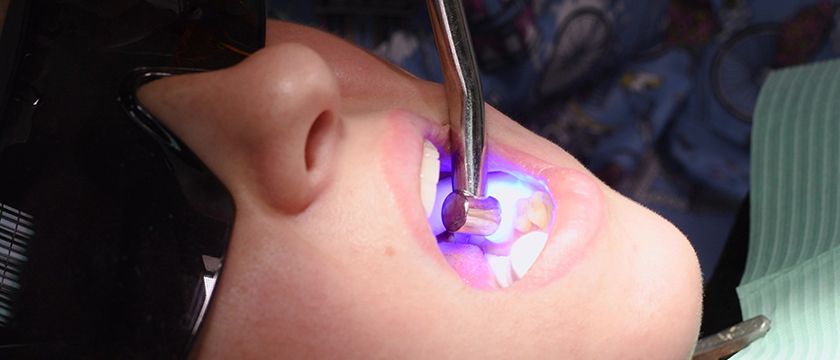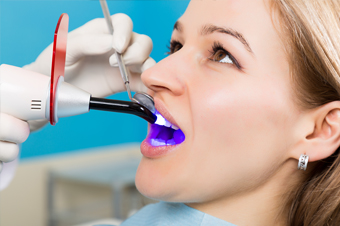 10 Oct 2023
10 Oct 2023
Many people wish they could change a few small things about their smile but are not willing to undergo invasive treatments like orthodontics or crowns.
Dental bonding offers a quick and easy solution to minor cosmetic dental problems. This simple treatment can fix everything from gapped teeth to craze lines and can be completed in just one appointment. However, there are a few downsides to the procedure that you should be aware of. Today’s post will tell you everything you need to know about dental bonding and what it can do for you.
What is Dental Bonding?
Dental bonding is a technique used to restore the appearance and function of damaged teeth. Dentists perform dental bonding by applying layers of composite material to small areas of a tooth that are chipped, worn, or discoloured.
How Does Dental Bonding Work?
Dental bonding is a simple process that can be completed in just one appointment at your cosmetic dentist’s office. It begins with a comprehensive dental exam to make sure that your tooth is healthy enough for the procedure. Your dentist may take x-rays of your teeth to assess whether there is any decay or trauma present inside the tooth that cannot be seen with the naked eye.
Your dentist will then use a special acidic liquid or gel to roughen the areas of the tooth where the bonding will be applied. This allows the composite resin to better adhere to the tooth.
After this, your dentist will apply a strong dental adhesive to your tooth. They will then begin building up layers of composite material until the tooth has reached your desired size and shape.
Finally, your dentist will cure the resin composite using a special ultraviolet light. This hardens the resin and permanently attaches it to the tooth. They will then polish the resin so it looks just as shiny and white as your natural teeth.
What Types of Problems Can Dental Bonding Solve?
Dental bonding can be used to address almost any cosmetic dental issue, including:
- Chipped teeth
- Worn teeth
- Discoloured teeth
- Gaps between teeth
- Undersized teeth
Some cosmetic dental problems are better suited for treatment with crowns or veneers. Your dentist in Mississauga will let you know if you are a good candidate for dental bonding.
Advantages of Dental Bonding
- Cost. Dental bonding is extremely cost-effective. It is one of the least expensive cosmetic dental treatments available and is a great alternative to veneers or dental crowns for budget-conscious patients who still want to boost their self-confidence with a winning smile.
- Time. Dental bonding is an extremely quick procedure. You can get it done in a single appointment in most cases. If any adjustments are needed, they can be performed immediately in-office with minimal anesthesia.
- Invasiveness. Dental bonding is one of the least invasive cosmetic dentistry treatments on the market. Unlike crowns and veneers, it allows you to preserve most of your natural tooth structure. No surgery is required, and most people don’t need anesthesia.
Disadvantages of Dental Bonding
- Staining. Dental bonding is made of a porous resin composite that is very easy to stain. Consuming dark-coloured food and drink can easily discolour your bonding and make it obvious that the resin is not part of your natural teeth. If this happens, you will have no choice but to replace the bonding with fresh composite to restore the appearance of your teeth.
- Durability. Dental bonding does not last as long as crowns or veneers. Any dental bonding done on the edges of your teeth will sustain additional force when you use those teeth to chew or bite food, making the bonding wear out even more quickly.
How Long Does Dental Bonding Last?
Most dental bonding lasts between 4 and 8 years. Bonding that is done by the best cosmetic dentists usually lasts longer.
Bonding on the edges of teeth may not last as long as bonding done elsewhere. This is due to the heavy bite forces exerted in those areas when you bite down.
How to Care for Your Teeth After Your Procedure
After you receive dental bonding, be sure to brush and floss your teeth regularly. Cavities can quickly form along the edges of dental bonding without consistent dental hygiene.
Do not bite directly into hard or crunchy foods if you have dental bonding done on your front teeth. Use a knife to cut these foods up instead.
You should also avoid consuming dark-coloured food and drinks like tea, coffee, and wine. These substances may stain your dental bonding and spoil its cosmetic effect.
What Is the Difference Between Bonding and Veneers?
Dental bonding and porcelain or composite veneers are similar treatments, each offering patients a way to disguise imperfections in their teeth. The main difference between them is that while veneers cover the entire front surface of a tooth, dental bonding usually covers just part of it. The best dentists for porcelain veneers can make your teeth look just like those of Hollywood stars.
If you are not sure which procedure to choose, ask your dentist for advice. They will let you know if your case is better suited for one treatment or the other.
Common FAQs
1. Will Insurance Cover My Procedure?
Dental bonding is usually considered to be a cosmetic procedure, meaning that it is not covered by most insurance plans. However, your plan may be different. Ask your insurance provider about what your plan covers and how much you could save.
2. Who Gets This Cosmetic Procedure?
Anyone who is unhappy with aspects of their teeth may choose to get dental bonding done. Your dentist will use dental bonding to cover discolouration, worn teeth, chips in your teeth, and other imperfections.
3. What Are the Risks?
The only risk associated with dental bonding is the procedure’s lack of durability. The resin used to perform the bonding can easily break if it is exposed to high amounts of pressure. Activities like chewing ice, opening packages with your teeth, and chewing on your fingernails all make breakage even more likely.
4. What Should I Do After My Appointment?
After your dental bonding appointment, continue caring for your teeth as you normally would. Brush and floss as usual in the area around the bonding. If your bite feels strange or you notice any sharp edges around the bonding, let your dentist know. They may need to shave down parts of the composite to make it fit more comfortably in your mouth.
Visit Trillium Smile Dentistry for Your Cosmetic Dental Procedures

If you are interested in getting dental bonding, Trillium Smile Dentistry is one of the top cosmetic dental clinics in Mississauga. You can trust us to perform your dental bonding procedure with care and consideration, taking the time to install a beautiful and long-lasting solution for your dental troubles. Contact us today and see how this simple cosmetic dental procedure could change your life for the better.
